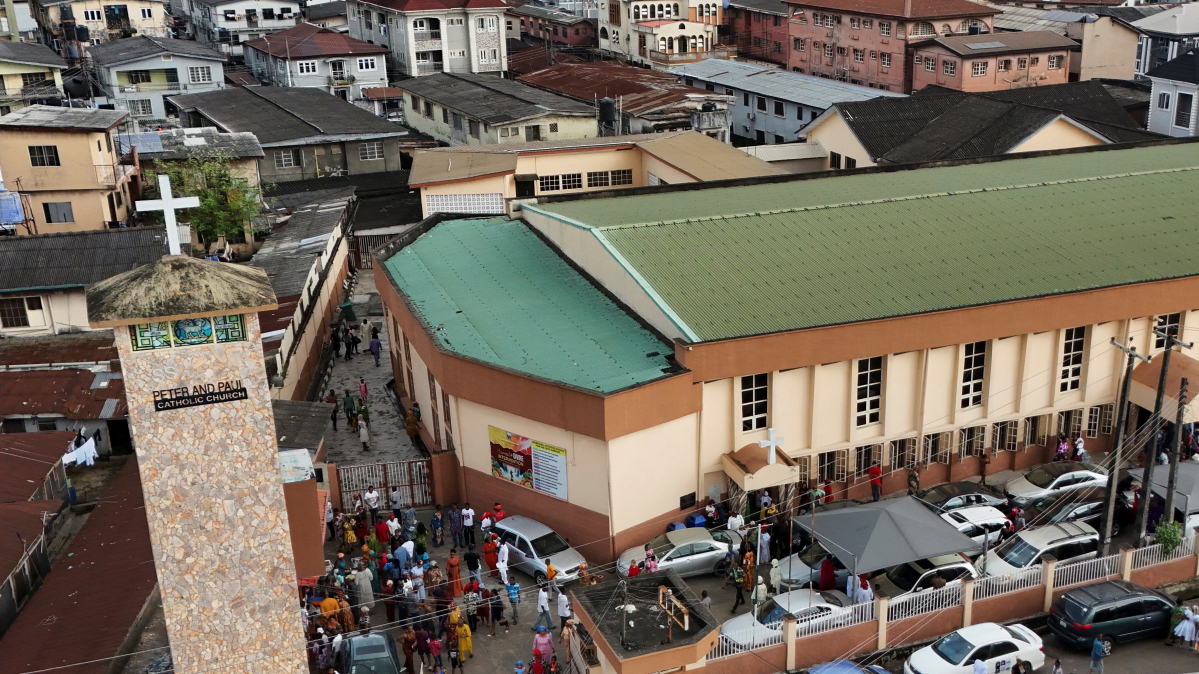Ukraine imposes new sanctions targeting Russian maritime and defence supply chains
Ukraine’s President Volodymyr Zelenskyy has approved new sanctions targeting Russian maritime operators, defence-linked companies and individuals co...

Nigeria welcomes U.S. help against Islamist insurgents if its territorial integrity is respected, responding to Trump’s threats over alleged mistreatment of Christians.
Nigeria sought to calm tensions with Washington after U.S. President Donald Trump said he had instructed the Defence Department to prepare for "fast" military action in the West African country if authorities fail to curb attacks on Christians. "We welcome U.S. assistance as long as it recognises our territorial integrity," Daniel Bwala, an adviser to Nigerian president Bola Tinubu, told Reuters.
Speaking to reporters aboard Air Force One on Sunday, Trump said the U.S. military could deploy troops to Nigeria or carry out air strikes to halt what he described as the killing of "very large numbers" of Christians, but gave no further details. "I envisage a lot of things," Trump said, without elaborating.
Bwala played down the dispute, saying Trump’s "disgraced country" remark was not taken literally. "We know Donald Trump thinks well of Nigeria," he said. "I am sure by the time these two leaders meet and sit, there will be better outcomes in our joint resolve to fight terrorism."
Nigeria, a nation of more than 200 million people divided between the largely Muslim north and mostly Christian south, has battled Islamist insurgents such as Boko Haram and Islamic State West Africa Province for more than 15 years. These groups have killed thousands, mostly in the northeast, where the population is predominantly Muslim. While Christians have been killed, analysts say the majority of victims have been Muslims.
In central Nigeria, clashes between mostly Muslim herders and mainly Christian farmers over access to land and water are frequent, while gunmen in the northwest routinely attack villages and kidnap residents for ransom. "Nigeria does not discriminate against any tribe or religion in the fight against insecurity," Bwala said. "There is no Christian genocide."
Ladd Serwat, senior Africa analyst at U.S.-based crisis-monitoring group ACLED, said insurgent groups often present their campaigns as anti-Christian, but their violence "is indiscriminate and devastates entire communities." He noted that ACLED recorded 1,923 attacks on civilians in Nigeria so far this year, of which 50 specifically targeted Christians for their faith. Serwat said claims circulating among some U.S. right-wing circles that as many as 100,000 Christians have been killed in Nigeria since 2009 are not supported by data.
Trump’s warning followed Washington’s decision to add Nigeria back to the "Countries of Particular Concern" list of nations accused of violating religious freedoms. Other countries on the list include China, Myanmar, North Korea, Russia and Pakistan.
Tinubu, a Muslim from southern Nigeria married to a Christian pastor, rejected accusations of religious intolerance, defending his government’s record on religious freedom. He has aimed to ensure a Muslim-Christian balance in major appointments, recently naming a Christian as defence chief.
In Abuja, some churchgoers said they would welcome U.S. military intervention. "I feel if Donald Trump said they want to come in, they should come in and there is nothing wrong with that," said businesswoman Juliet Sur.
Security experts, however, said any U.S. air strikes would face challenges given the militants’ mobility and the U.S. withdrawal from Niger, which borders Nigeria to the north. The insurgents move between Nigeria, Cameroon, Chad and Niger, and analysts said the U.S. would likely need help from the Nigerian military, which Trump threatened to cut off from assistance, to target dispersed militant groups.
Quentin Griffiths, co-founder of online fashion retailer ASOS, has died in Pattaya, Thailand, after falling from the 17th floor of a condominium on 9 February, Thai police confirmed.
Ukraine’s National Paralympic Committee has announced it will boycott the opening ceremony of the Milano Cortina 2026 Paralympics in Verona on 6 March, citing the International Paralympic Committee’s decision to allow some Russian and Belarusian athletes to compete under their national flags.
Eric Dane, the actor best known for his roles in 'Grey’s Anatomy' and 'Euphoria', died on Thursday, at the age of 53 after a battle with amyotrophic lateral sclerosis (ALS). His family confirmed his death after what they described as a “courageous battle” with ALS.
An Austrian climber has been convicted of gross negligent manslaughter after his girlfriend died from hypothermia while climbing Austria’s highest peak, the Grossglockner, in January 2025.
President Donald Trump said on Saturday (21 February) that he will raise temporary tariffs on nearly all U.S. imports from 10% to 15%, the maximum allowed under the law, after the Supreme Court struck down his previous tariff program.
Ukraine’s President Volodymyr Zelenskyy has approved new sanctions targeting Russian maritime operators, defence-linked companies and individuals connected to Moscow’s military and energy sectors, according to official decrees issued on Saturday.
Divers have recovered the bodies of seven Chinese tourists and a Russian driver after their minibus broke through the ice of Lake Baikal in Russia, authorities said.
A technical fault in the helium system of NASA’s next-generation moon rocket was announced on Saturday, ruling out the planned March launch window for the Artemis II mission.
President Donald Trump said on Saturday (21 February) that he will raise temporary tariffs on nearly all U.S. imports from 10% to 15%, the maximum allowed under the law, after the Supreme Court struck down his previous tariff program.
Germany's ruling conservatives on Saturday (21 February) passed a motion to ban social media use for under 14s and introduce more stringent digital verification checks for teenagers, building momentum for such limits in Germany and elsewhere in Europe.
You can download the AnewZ application from Play Store and the App Store.

What is your opinion on this topic?
Leave the first comment